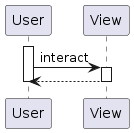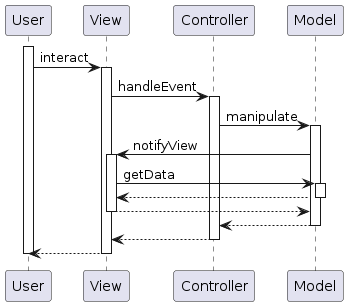classBlacklistRegexp
Description
With the help of this configuration parameter it is possible to remove classes from the call sequence flow. If they are removed, no subsequent calls are part of the diagram anymore.
Example
In the following example there are three dependencies in the maven dependency hierarchy which build the classpath for all further generation:
<dependencies>
<dependency>
<groupId>de.elnarion.util</groupId>
<artifactId>plantuml-generator-util</artifactId>
<version>@project.version@</version>
<classifier>tests</classifier>
<type>test-jar</type>
</dependency>
<dependency>
<groupId>commons-io</groupId>
<artifactId>commons-io</artifactId>
<version>2.16.1</version>
</dependency>
<dependency>
<groupId>javax.persistence</groupId>
<artifactId>javax.persistence-api</artifactId>
<version>2.2</version>
</dependency>
</dependencies>From this classpath all classes which do not match the regular expression .*(Controller|Model) should be part of the generated sequence diagram. This is similar to the JUnit-tests of the PlantUML generator utility:
<plugin>
<artifactId>plantuml-generator-maven-plugin</artifactId>
<groupId>de.elnarion.maven</groupId>
<version>@project.version@</version>
<executions>
<execution>
<id>generate-simple-diagram</id>
<goals>
<goal>generateSequenceDiagram</goal>
</goals>
<phase>generate-test-sources</phase>
<configuration>
<outputFilename>testsequencediagram1.txt</outputFilename>
<startClass>de.elnarion.test.sequence.t0004.User</startClass>
<startMethod>interaction</startMethod>
<classBlacklistRegexp>.*(Controller|Model)</classBlacklistRegexp>
</configuration>
</execution>
</executions>
</plugin>which is rendered this way:

and produces this PlantUML diagram text:
@startuml
participant User
participant View
activate User
User -> View : interact
activate View
View --> User
deactivate View
deactivate User
@endumlWithout the blacklist the diagram would look like this:
